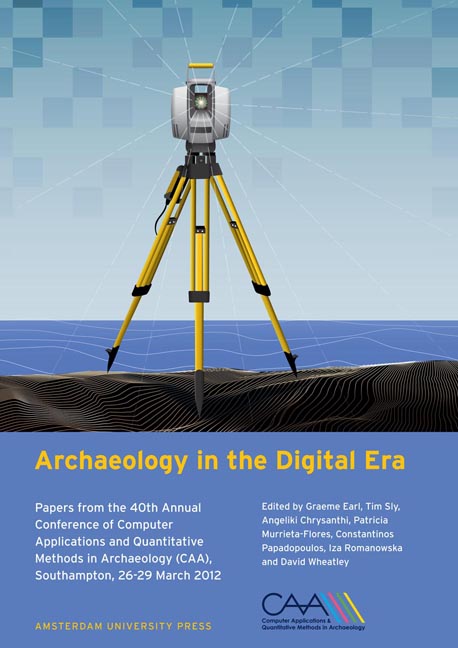 Archaeology in the Digital Era
Archaeology in the Digital Era Disciplinary Issues: Challenging the Research and Practice of Computer Applications in Archaeology
Published online by Cambridge University Press: 16 February 2021
Summary
Abstract:
An annual international conference on computer applications in archaeology (CAA) has been meeting annually for almost forty years, so one might expect that there would be a reasonable idea of the nature and role of archaeological computing. However, some commentators see it as an emerging field while others suggest the need for a new archaeological speciality: Archaeological Information Science. Even the Wikipedia page on computational archaeology describes archaeoinformatics as an emerging discipline. Is this a sign of a lack of confidence in forty years-worth of enterprise and development or is it instead an indication of growing self-assurance in the subject? In recent years other fields, including GIScience and Information Systems, have sought to evaluate their intellectual core and identity; this paper suggests that it is time that archaeological computing does likewise.
Keywords:
Archaeoinformatics, Archaeological Information Science, Archaeological Computing, Digital Archaeology, Anxiety Discourse, Grand Challenges
Established or Emergent?
In 1967 George Cowgill suggested that the earliest use of electronic data processing in European archaeology was by Peter Ihm and Jean-Claude Gardin in 1958/1959 and in the USA by Janies Deetz in i960 (Cowgill 1967, 17). Since then, activity in archaeological computing has grown substantially, especially since the first personal computer revolution in the 1980s, and the annual Computer Applications in Archaeology (CAA) conference has been meeting since 1973. It is surprising, then, that a series of articles presenting examples of archaeological computing in a recent issue of the Institute of Electrical and Electronics Engineers (IEEE) Computer Society magazine Computer were described as coming from “the emerging field of computational archaeology - the interface where archaeology meets computer science” (Bimber and Chang 2011, 31). Archaeological computing practitioners might be forgiven for thinking that work on this interface had been going on for over 50 years. Why might this apparent disconnect have arisen?
A simple reaction would be to suggest that the perception of the field as ‘emerging’ is simply mistaken. However, Bimber and Chang are not alone their characterisation. For example, Marcos Llobera has argued for the creation of a new focus in archaeology, Archaeological Information Science (AISc), ”… concerned with the generation, representation and manipulation of archaeological information within the context of information systems.”
- Type
- Chapter
- Information
- Archaeology in the Digital EraPapers from the 40th Annual Conference of Computer Applications and Quantitative Methods in Archaeology (CAA), Southampton, 26-29 March 2012, pp. 13 - 24Publisher: Amsterdam University PressPrint publication year: 2014


